Xdebug Update: July 2020
Another monthly update where I explain what happened with Xdebug development in this past month. These will be published on the first Tuesday after the 5th of each month. Patreon and GitHub supporters will get it earlier, on the first of each month. You can become a patron to support my work on Xdebug. If you are leading a team or company, then it is also possible to support Xdebug through a subscription.
In July, I worked on Xdebug for about 100 hours, with funding being around 70 hours. I worked mostly on the following things:
Xdebug 3
I spend nearly all of my time improving performance this month, with some help by Michael Voříšek for the profiler feature. Some of this work I have done live through Twitch where I stream (almost) every Monday at 15:30 BST (14:30 UTC/10:30 EDT). Past sessions are available on Vimeo.
In order to find out what can be improved I profiled Xdebug running various workloads. I have selected the following workloads per Xdebug mode
-
off: zetacomponents Document test suite
-
develop: "composer update" for Pimcore, "composer update" for ShopWare
-
coverage: PHPUnit test suite coverage
-
profiling: akt-ui
If you have any specific one you'd like to see added, please let me know and I'll see whether I have CPU cycles for it—running composer update for Pimcore under the C profiler Valgrind takes 2½ hours per run!
In any case, the profiling found out the following possible improvements:
Use zend_string for filenames and variable names
Most of Xdebug was written before PHP 7, and when updating Xdebug to work with both PHP 5 and PHP 7 certain PHP 5 APIs, wrapped in macros to make it work with PHP 7, remained in use by Xdebug. When dropping PHP 5 support, I did not update these APIs to use the PHP 7 variant. One of these APIs is that in PHP 5, strings were often passed around as a char string, size_t len pair. PHP 7 introduced a new data type zend_string str which encapsulates both elements of the pair, and also introduced reference counting for zend_string s, which reduces the need for duplication of memory. This gave about a ~2% performance boost to Wall Time (the time passage as indicated by a clock), and about a 5% reduction in CPU instructions.
Switch xdebug_sprintf to a new xdebug_str_add_fmt
Xdebug often needs to convert data into a single string, for either writing to file or network, storing function names with arguments in memory, or display purposes. It uses an API xdebug_sprintf which allocates new memory and formats the string according to format specifiers. Often it needs to add this to a xdebug_str buffer that makes up a longer piece of text. After it has added it to that buffer, it frees the allocated memory again.
By creating a new API that can add a formatted string to an xdebug_str buffer, I managed to reduce the amount of memory allocations and frees dramatically. This gave a 10-15% Wall Time performance boost, and a 10-25% reduction in CPU instructions.
Use a vector instead of a list for the stack
Xdebug's internals contain a stack of all the functions that are called. Every time a new function is called, a new stack level is allocated, and when the function ends this stack element is freed up. In applications which call a lot of small functions, such as Composer, this repeated allocation and freeing of memory, as well as the maintenance of the links in the list, is expensive.
I switched this list approach to use a Vector, which is a continuous amount of allocated memory, without the need for an allocation and free for every function that is being called. This gave a 2-6% Wall Time performance boost, most notably with Composer, and a 3-10% reduction in CPU instructions.
Buffering for the profiler
Most of the work on Xdebug's profiler were initiated by Michael Voříšek. The main performance boost was to use the new xdebug_str_add_fmt API, but also changing the initial size of xdebug_str buffers from 1 to 32, as most of the strings are of that length. This will use a bit more memory.
The other big part of the performance improvements for profiling is to no longer use fprintf and fflush a lot. Instead Xdebug now uses an xdebug_str, the new xdebug_str_add_fmt API, and also a new API function to format a number to an xdebug_str without having to use the xdebug_sprintf API call.
These, as well as the other mentioned changes reduced Wall Time, as well as CPU instructions, for profiling by about 40%.
I will continue to work on improving performance in September, but here are some graphs:
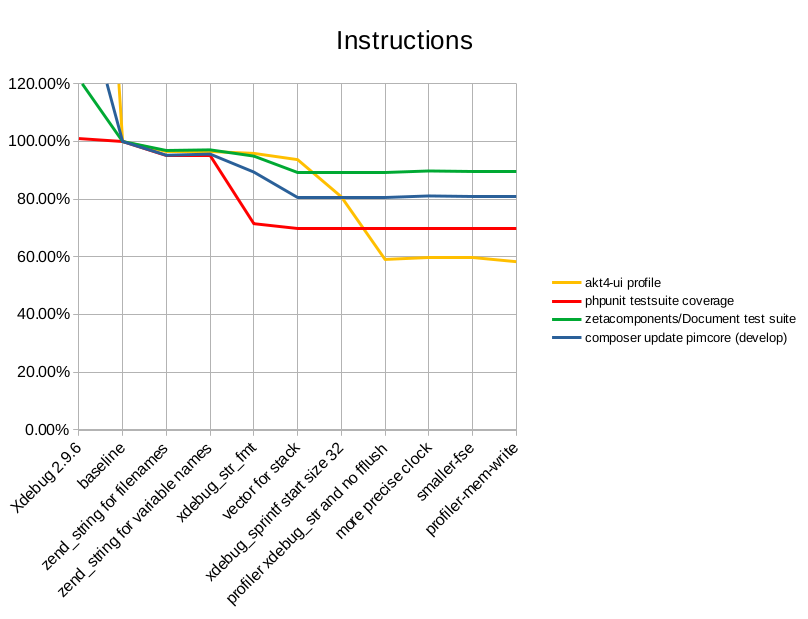
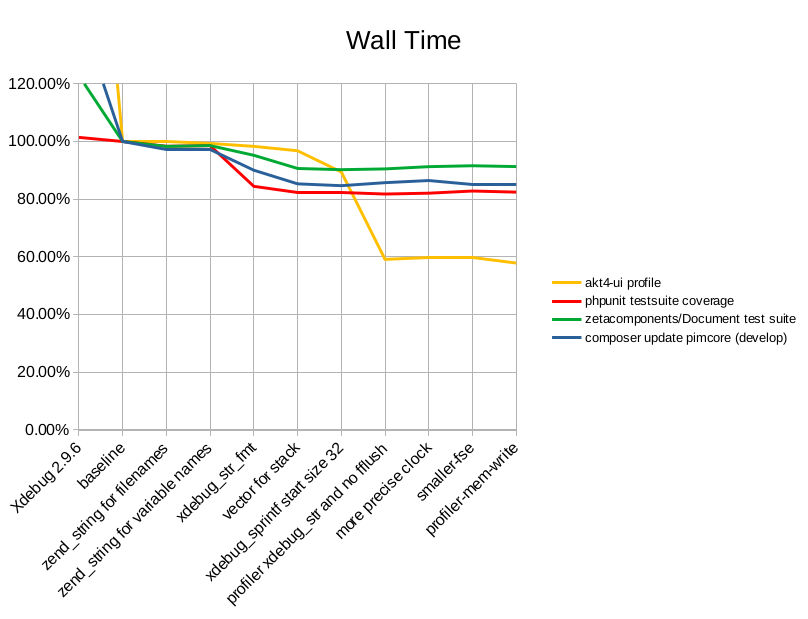
You might notice that the Xdebug 2.9.6 data is off the chart, here are they with Xdebug 2.9.6 included ;-)
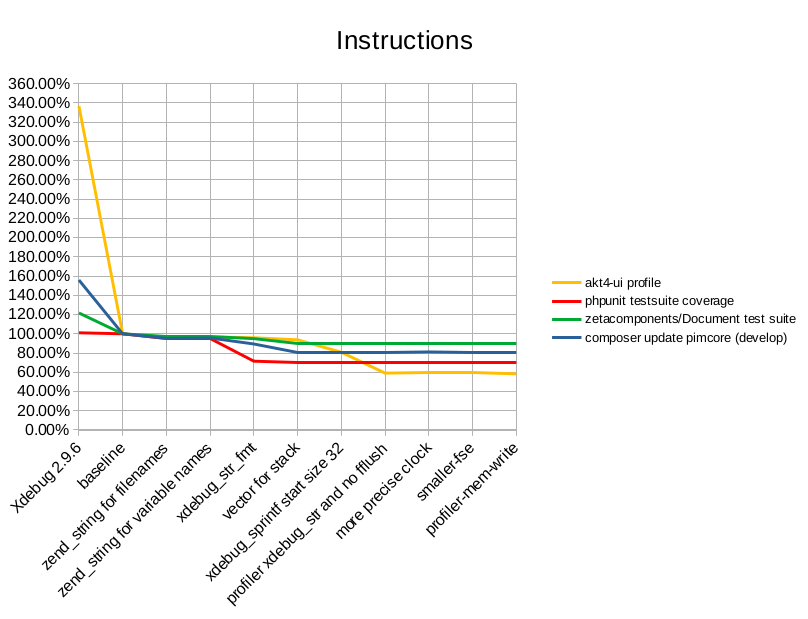
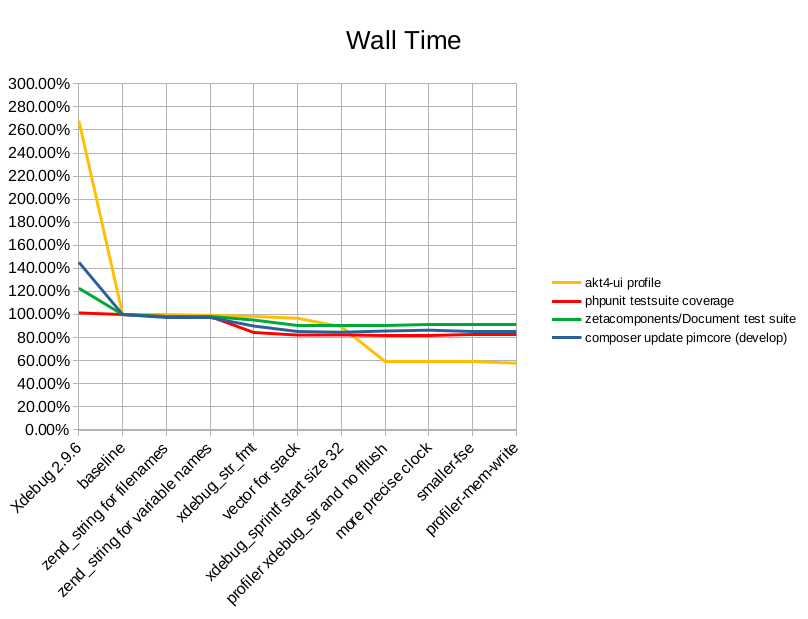
Xdebug Cloud
The only time I spend in August on Xdebug Cloud is some further conversations with JetBrains. I am going to work on Xdebug Cloud returns in August, starting with a introductionary stream on Xdebug Cloud today at 15:30 BST on Twitch.
If you want to be kept up to date with Xdebug Cloud, please sign up to the mailinglist I'll let you know as soon as something can be tried-out.
Business Supporter Scheme and Funding
In July, no new supporters signed up.
If you, or your company, would also like to support Xdebug, head over to the support page!
Besides business support, I also maintain a Patreon page and a profile on GitHub sponsors.
Life Line
Created a bench and a crossing
Created 2 benches and a crossing; Updated 5 cushions, a post_box, and a crossing
Created a crossing; Updated a cushion
If you were wondering whether the www.php.net & downloads.php.net services weren't responding very well in the last 6 hours — thousands of requests/sec to https://www.php.net/ 's root.
The server's load was 720, didn't die, but CDN connections to it timed out.
Now there is a caching strategy in place for a selected set of resources.
Updated a bench
Created 3 benches; Updated 10 benches
Updated a bench
Updated a bus_stop
Created a bench and a waste_basket; Updated 6 bus_stops and a crossing
Created 2 waste_baskets and a recycling; Updated 2 bicycle_parkings and a recycling
Updated a fast_food, a funeral_directors shop, and 2 other objects; Confirmed a fast_food and a hairdresser shop
Created an information; Updated 3 benches and 2 waste_baskets
Updated 2 benches and a waste_basket
Updated a bench
Created a waste_basket and an information
Created a waste_basket
I hiked 18.0km in 4h1m52s
I walked 1.4km in 17m19s
I walked 4.5km in 1h21m49s
I just made and ate, a bowl full of bacon fried Brussels Sprouts. Not under duress, and out of my own free will.
Added new residential building
Created a hairdresser shop; Confirmed a convenience shop and a dry_cleaning shop
Created a building_materials shop, a vacant shop, and 4 other objects; Confirmed a hairdresser shop, a cafe, and 2 other objects
I walked 8.3km in 1h33m44s



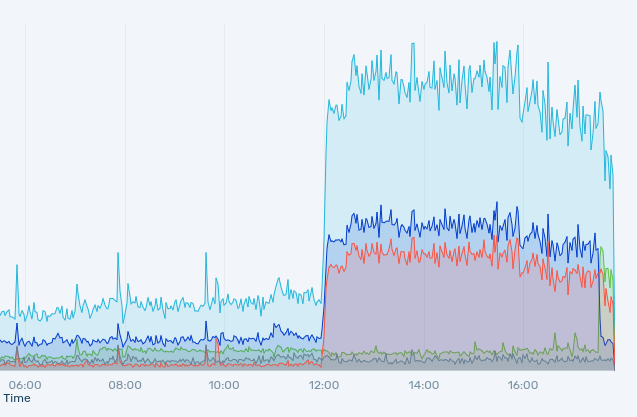

Shortlink
This article has a short URL available: https://drck.me/xdebug-20jul-fos